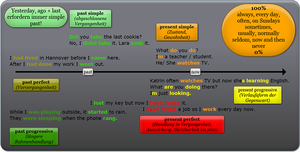Present Simple/Formen von "to be": Unterschied zwischen den Versionen
K (Textersetzung - „[[Englisch/Grammatik/Tenses“ durch „[[Tenses“) |
(kat) Markierung: Quelltext-Bearbeitung 2017 |
||
| (4 dazwischenliegende Versionen desselben Benutzers werden nicht angezeigt) | |||
| Zeile 3: | Zeile 3: | ||
Im Deutschen werden alle Verben {{wpde|Konjugation (Grammatik)|konjugiert}}, d.h. je nach Geschlecht, Anzahl und Zeit verändert. Im Englischen gibt es nur das ''he,she,it-s''. | Im Deutschen werden alle Verben {{wpde|Konjugation (Grammatik)|konjugiert}}, d.h. je nach Geschlecht, Anzahl und Zeit verändert. Im Englischen gibt es nur das ''he,she,it-s''. | ||
Nur das '''Verb "''to be''"''' hat auch im [[ | Nur das '''Verb "''to be''"''' hat auch im [[Present Simple|Present Simple]] mehrere Formen (''am'', ''is'', ''are''). | ||
Zur besseren Übersicht sind in der Tabelle die [[Pronouns#Subject_Pronouns|Personalpronomen]] vor die jeweilige Verbform gestellt: | Zur besseren Übersicht sind in der Tabelle die [[Pronouns#Subject_Pronouns|Personalpronomen]] vor die jeweilige Verbform gestellt: | ||
| Zeile 55: | Zeile 55: | ||
A genius ''is (be)'' a very clever person. Snow ''is (be)'' white. We ''are (be)'' in a class. }} | A genius ''is (be)'' a very clever person. Snow ''is (be)'' white. We ''are (be)'' in a class. }} | ||
=== negative forms === | |||
{{#ev:youtube|Ia0FgQNilfY}} | |||
'''Write the correct form of the verb "to be". Sometimes you need the negative!''' | '''Write the correct form of the verb "to be". Sometimes you need the negative!''' | ||
| Zeile 107: | Zeile 109: | ||
{{Fortsetzung| | |||
weiter=He, she, it …<br>(3. Person Singular)|weiterlink=Present_Simple/He,_she,_it_...| | |||
vorher=Present Simple<br>(Übersicht)|vorherlink=Present_Simple}} | |||
{{Present Simple}} | |||
{{Tenses}} | {{Tenses}} | ||
| Zeile 114: | Zeile 120: | ||
[[Kategorie:Englisch]] | [[Kategorie:Englisch]] | ||
[[Kategorie: | [[Kategorie:Grammatik]] | ||
[[Kategorie:Interaktive Übung]] | [[Kategorie:Interaktive Übung]] | ||
{{SORTIERUNG:{{SUBPAGENAME}}}} | {{SORTIERUNG:{{SUBPAGENAME}}}} | ||
Aktuelle Version vom 25. April 2022, 18:08 Uhr
Im Deutschen werden alle Verben konjugiert![]() , d.h. je nach Geschlecht, Anzahl und Zeit verändert. Im Englischen gibt es nur das he,she,it-s.
, d.h. je nach Geschlecht, Anzahl und Zeit verändert. Im Englischen gibt es nur das he,she,it-s.
Nur das Verb "to be" hat auch im Present Simple mehrere Formen (am, is, are).
Zur besseren Übersicht sind in der Tabelle die Personalpronomen vor die jeweilige Verbform gestellt:
| Singular (Einzahl) | Plural (Mehrzahl) | |
|---|---|---|
| 1.Person | I am | we are |
| 2. Person | you are | you are |
| 3. Person | he, she, it is | they are |
Interactive Exercises
Put the correct form of the verb "to be" into the gaps:
I am Cindy. That is Mandy. We are twelve.
Robert is fifteen. The house is blue. They are in London.
I am fourteen. Today is Tuesday.
Write the correct form of the verb "to be" into the gaps:
The bike is (be) blue. The tree is (be) green. The Burtons are (be) in London.
The room is (be) black. I am (be) a pupil.
The pupils are (be) nervous, because they write a test.
The people are (be) in front of the house.
A genius is (be) a very clever person. Snow is (be) white. We are (be) in a class.
The bike is (be) blue. The tree is (be) green. The Burtons are (be) in London.
The room is (be) black. I am (be) a pupil.
The pupils are (be) nervous, because they write a test.
The people are (be) in front of the house.
A genius is (be) a very clever person. Snow is (be) white. We are (be) in a class.
negative forms
Write the correct form of the verb "to be". Sometimes you need the negative!
Becky is (???) twelve. Robert isn't|is not (???) twelve but thirteen!.
Sarah and David are(???) both (=beide) eleven years old.
"You want to see a horror movie? - No way, you are (???)' only (=nur) twelve, you aren't|are not(???) old enough!"
"But Mummy, I am (???) the only (hier: =einzige) boy who isn't allowed to go."
Sarah and David are(???) both (=beide) eleven years old.
"You want to see a horror movie? - No way, you are (???)' only (=nur) twelve, you aren't(???) old enough!"
"But Mummy, I am (???) the only (hier: =einzige) boy who isn't allowed."
short answers
Don't answer just "Yes!" or "No." Write short answers:
1. Are these people your parents? - Yes, they are.
2. Is your mother a teacher? – No, she isn't.
3. Am I in your class, Jessie? – Yes, you are.
4. Have you got your homework? - Yes, I have.
5. Is your pencil sharp (spitz)? – No, it isn't.
6. Is David a boy? – Yes, he is.
Don't answer just "Yes!" or "No." Write short answers:
1. Are your parents untidy? – Yes, they are().
2. Is Mr Scharwies our English teacher? – Yes, he is().
3. Is your sister at this school? – Yes, she is().
-s muss mit!
Present Simple
(die einfache Gegenwart)
Past Tense:
Present Tense:




